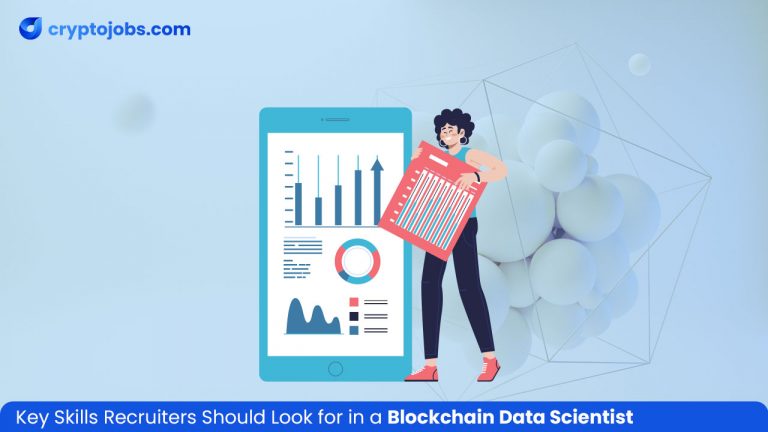
Key Skills Recruiters Should Look for in a Blockchain Data Scientist
- cryptojobs.com
- March 25, 2024
- All Posts, Employer’s Guide
- hiring
- 0 Comments
Within the rapidly expanding field of blockchain data science, recruiters are always looking for candidates who possess a special combination of technical expertise and collaborative skills. The capacity to decipher intricate data puzzles and derive actionable insights that drive corporate choices toward profitability and innovation makes data scientists indispensable players in the blockchain industry.
For recruiters entrusted with finding the best talent in the field of blockchain data science, the perfect applicant has to have a combination of technical expertise and soft skills. Both aspiring and seasoned data scientists must develop these essential skills to be competitive and flexible in this constantly evolving landscape.
This article explores the critical skills that hiring managers should look for in blockchain data scientists, providing information on the key characteristics that set outstanding applicants apart.
Check out: Expert Tips for Hiring Data Scientists in the Web3 Industry
1. Programming Languages
Employers looking for experienced data scientists should give preference to applicants with a foundational understanding of programming languages that are critical for organizing, evaluating, and handling large-scale datasets, or “big data.” Future data scientists should learn the foundational ideas of data science and start learning programming languages such as Python.
In addition to having the fundamental tools for data analysis, candidates who are proficient in these languages also show that they are dedicated to keeping up with the industry-standard technologies that are necessary for success in data science professions. Candidates who are proficient in these programming languages should be given preference by recruiters since they are essential to managing large volumes of data effectively and drawing conclusions from it, which benefits their companies greatly.
2. Statistics & Probability
Data science is essentially the application of tools, algorithms, and procedures to extract valuable insights from data. Candidates who possess a strong grasp of probability and statistics should be given preference by recruiters since these abilities enable data scientists to predict, discover anomalies in datasets, create connections, anticipate trends, and interpolate missing data points.
Utilizing their knowledge of probability and statistics, data scientists are essential in directing organizational decision-making processes. They use their analytical skills to forecast data performance and provide leadership teams with insightful recommendations based on thorough data analysis. Given how important statistics and probability are to making wise company decisions and enabling strategic development efforts, recruiters should aggressively seek out applicants with these talents.
3. Machine Learning
Data scientists use machine learning, a fundamental component of artificial intelligence, to find patterns in data and carry out complex computations. This invaluable tool reduces the possibility of human mistakes in addition to relieving some of the tasks held by data scientists.
When data scientists work with large datasets, the importance of machine learning is even more apparent. Real-time data analysis is made possible by the creation of strong algorithms and models made easier by machine learning. Through advanced graduate coursework or specialized certification programs, many data scientists become proficient in machine learning, improving their capacity to successfully utilize this potent technology.
4. Data Visualization
For data scientists, data visualization is an essential part of their everyday workday. With this ability, analytics experts may create visually appealing charts, maps, and graphs from intimidating arrays of numerical and textual data. These kinds of visual aids enable people without a lot of technical experience, like team leaders and business decision-makers, to quickly understand patterns and trends in data, reducing the time they need to explain things in detail.
Recruiters should give preference to candidates who are skilled in data visualization because they can communicate complex information understandably and concisely to a variety of audiences within an organization. This is because recruiters understand how important data visualization is in supporting efficient communication and decision-making.
5. Social Media Mining
Data extraction from websites like Facebook, X.com, Telegram, LinkedIn, and Instagram is known as social media mining. Competent data scientists use this data to find trends and extract significant insights, giving organizations a better understanding of the social media preferences and behaviors of their target audience. At the corporate level, this kind of analysis is essential to developing all-encompassing social media marketing plans.
As social media shows long-term sustainability and continues to wield major influence in everyday company operations, developing one’s abilities in social media data mining would be highly beneficial for aspiring data scientists.
6. Database Management
A data scientist’s work includes database administration, which frequently combines with their regular responsibilities in conjunction with specialized database administrators in businesses. Data scientists may more effectively access information from enterprise databases, increasing productivity and supporting data-driven decision-making processes by having a solid understanding of fundamental database management concepts.
With the help of these skills, data scientists can efficiently explore complicated databases, improving their ability to extract useful insights from data and facilitating the smooth flow of information among enterprises.
7. Microsoft Excel
Microsoft Excel may seem like a strange addition to the repertoire of sophisticated data scientist abilities, but it is a vital tool in the industry. Microsoft Excel has several features that are vital for data scientists, even though it is often associated with Microsoft’s basic Office suite. Excel enables experts to carry out complex statistical modeling and data analysis thanks to its built-in programming language, VBA, and Analysis ToolPak.
Check Out: 7 Technical Data Science Interview Questions to Ask
Data scientists who are proficient in Excel may use VBA to create macros that automate repetitive processes like project updates and payroll administration. Furthermore, Excel’s PivotTable function makes it possible to extract insights from complicated information quickly.
Now that you are familiar with the essential skills required by blockchain data scientists, your next challenge lies in targeting candidates for this purpose; cryptojobs.com stands out as a premium Web3 job board where you can recruit top talent with ease.




